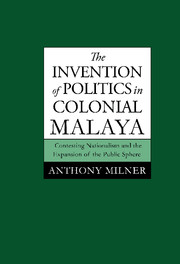 The Invention of Politics in Colonial Malaya
The Invention of Politics in Colonial Malaya Book contents
- Frontmatter
- Contents
- Preface
- Map of Malaya
- Introduction: Colonialism, Nationalism and Contest
- 1 The Ancien Régime: Described and Condemned
- 2 Establishing a Liberal Critique
- 3 A Description of the Real World: Expanding Vocabularies
- 4 Conceptualizing a Bangsa Community: A Newspaper of Moderate Opinions
- 5 Building a Bourgeois Public Sphere
- 6 Ideological Challenge on a Second Front: The Kerajaan in Contest with Islam
- 7 Answering Liberalism: Islamic First Moves
- 8 Kerajaan Self-reform: Chronicling a New Sultanate
- 9 Practising Politics in the Mid-Colonial Period
- 10 Surveying the Homeland: Sedar and Dialogic Processes
- Conclusion: The Malay Political Heritage
- Select Bibliography
- Index
3 - A Description of the Real World: Expanding Vocabularies
Published online by Cambridge University Press: 18 December 2009
- Frontmatter
- Contents
- Preface
- Map of Malaya
- Introduction: Colonialism, Nationalism and Contest
- 1 The Ancien Régime: Described and Condemned
- 2 Establishing a Liberal Critique
- 3 A Description of the Real World: Expanding Vocabularies
- 4 Conceptualizing a Bangsa Community: A Newspaper of Moderate Opinions
- 5 Building a Bourgeois Public Sphere
- 6 Ideological Challenge on a Second Front: The Kerajaan in Contest with Islam
- 7 Answering Liberalism: Islamic First Moves
- 8 Kerajaan Self-reform: Chronicling a New Sultanate
- 9 Practising Politics in the Mid-Colonial Period
- 10 Surveying the Homeland: Sedar and Dialogic Processes
- Conclusion: The Malay Political Heritage
- Select Bibliography
- Index
Summary
Culture is not always distilled or conveyed in magisterial texts. Abdullah's books, although often treated as isolated achievements, are classics in Malay literary development. They are works of vision and at the same time products of literary and conceptual experimentation. They feature prominently in every library of modern Malay writing. It is possible, however, to learn something more of the intellectual milieu which fostered the Munshi's radical critique of kerajaan society from a school geography book, the contents of which may seem to a modern reader to be unremarkable. If this textbook is examined from a kerajaan perspective, and if we pause to consider not just its subject matter but the concepts and rhetoric employed, it offers a glimpse of the ideological face of European expansionism. For those who were on the receiving end of imperialism, this type of work had the potential to represent a challenge as potent as the Gatling gun. It was a challenge to which Abdullah and his successors responded in more than one way.
The geography, the Hikayat Dunia, was published in 1855 at Bukit Zion, a Singapore printing and teaching establishment run by one of the most active Protestant missionaries, Benjamin Keasberry. Abdullah taught Malay to Keasberry (the son of an Indian army colonel who served with Raffles in Java) and assisted him in translating numerous textbooks into Malay. Abdullah probably helped produce the Hikayat Dunia although I cannot discern whether it was a translation of an English book or written largely by Keasberry himself.
The missionaries have rarely been portrayed as men of influence in the Malay communities and they certainly could claim few converts to Christianity.
- Type
- Chapter
- Information
- The Invention of Politics in Colonial MalayaContesting Nationalism and the Expansion of the Public Sphere, pp. 59 - 88Publisher: Cambridge University PressPrint publication year: 1995


